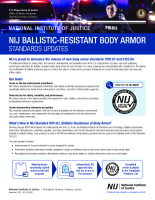Development
What FSSP Leaders Should Know About Artificial Intelligence And Its Application To Forensic Science In-Brief
Advances in Detecting and Identifying Explosives After an Attack
Highlighting Significant NIJ Forensic Science Investments: The University of Tennessee, Knoxville Site Visit
NIJ FY24 Research on the Abuse, Neglect, and Financial Exploitation of Older Adults
Accounting for Covariates in Forensic Error Rate
Gunshot Detection Technology Effect on Gun Violence in Kansas City, Missouri: A Microsynthetic Control Evaluation
2024 NIJ Forensic Science Research and Development Symposium
Updated Body Armor Standard Takes Aim at New Challenges
NIJ has released an updated body armor standard to keep up with evolving weapons, improve female officer safety.
NIJ Ballistic-Resistance Body Armor Standards Updates
NIJ Awards $16M to Support Forensic Science Research
On September 26, 2023, NIJ announced $16 million in new funding to support 33 projects under the FY23 Research and Development in Forensic Science for Criminal Justice Purposes solicitation. Through this program, NIJ continues to advance the speed, accuracy, and reliability of forensic analysis, which ultimately bolsters the administration of justice.
Funding Highlights for Fiscal Year 2023
Since 2009, NIJ has invested nearly $300 million...
Webinar: NIJ Research Assistantship Program Informational Webinar
This recorded webinar, originally held September 28, 2023, provides information on NIJ’s Research Assistantship Program, which offers highly qualified doctoral students the opportunity to bring their expertise to NIJ to work across offices and program areas to obtain a practical and applied research experience. The program is a research focused professional development opportunity for doctoral students from all academic disciplines. NIJ...
Recovery and Analysis of Less Volatile Components for the Identification of Ignitable Liquid Residues in Fire Debris - Continuation of current NIJ-funded project (2020-DQ-BX-0003)
Research and Development of an Approach for Non-invasive Determination of Cannabis Ingestion for Forensic Science Purposes
FIU - Forensic Technology Center of Excellence
Evaluation of Target Enrichment for SNP Genotyping of Skeletal Remains
Forensic Technology Center of Excellence, Fiscal Year 2021
Funding Support for the Operations of the Committee on Law and Justice of the National Academies of Sciences, Engineering, and Medicine
Implementation of NPS Discovery – An Early Warning Systems for Novel Drug Intelligence, Surveillance, Monitoring, Response, and Forecasting using Drug Materials and Toxicology Populations in the US
Sampling and Selection Bias in Research using Documented Skeletal Collections
Meeting People Where They Are to Improve Institutional Culture
Meeting People Where They Are to Improve Institutional Culture
Incarcerated individuals deserve opportunities for healing and growth, but they often lack the necessary resources for such opportunities. Additionally, organizational cultures that don’t support these outcomes often stand in the way. Researchers and practitioners gathered at NIJ’s 2023 National Research Conference to share ideas and projects that will increase opportunities for incarcerated populations around the country. This show continues their conversation.





